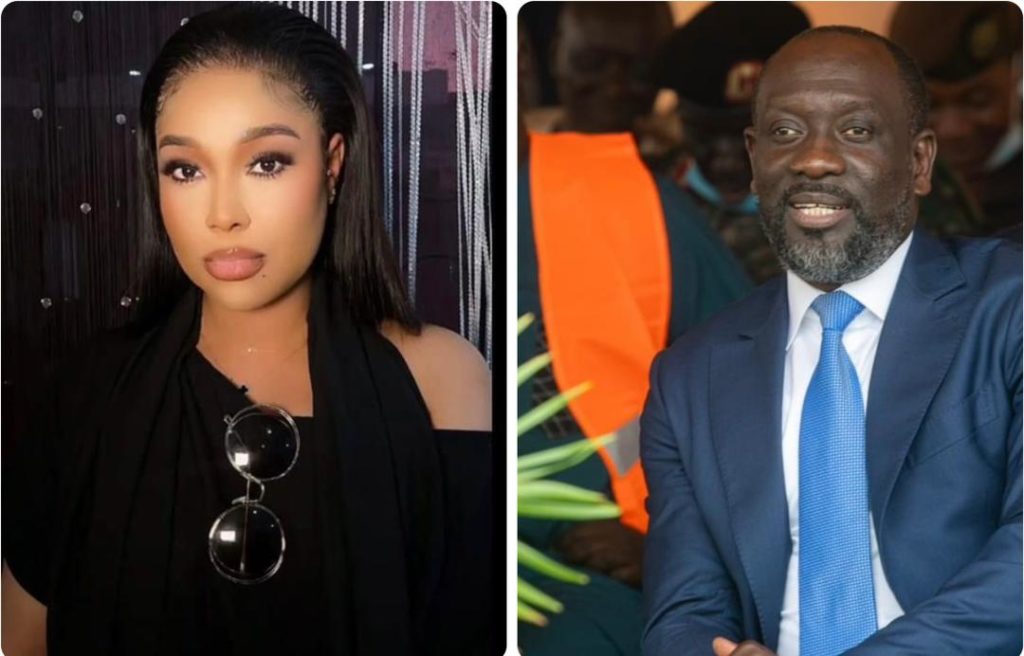Fatty’s Lawyer Challenges Admission Of Thiam’s Gold Receipts As Evidence

Aisha Fatty, Gambian socialite and businessman Abdoulaye Thiam
By Landing Ceesay
Lamin S. Camara, the lawyer representing Aisha Fatty, has objected to the admissibility of the translations of Abdoulaye Thiam’s gold purchase receipts.
Camara’s objection was made after Lamin A. Ceesay, Thiam’s lawyer, informed the court that he intended to tender additional documents marked numbers 3 and 4 on the plaintiff’s list of documents filed on June 7, 2023. Ceesay told the court that the documents are receipts for the gold purchased and their translations from French to English. He stated that document number 3 is a receipt, and document number 4 is the translation of the receipt.
“We apply to tender the documents, my lord,” counsel L. A. Ceesay said.
In response to the plaintiff’s attempt to introduce document number 3 (receipts) into evidence, Counsel L. S. Camara, representing Aisha Fatty (1st Defendant), objected to the admissibility of the document.
Counsel Camara argued that the document is not admissible because it is not in the language of the court, which is English. He also pointed out that the document is not an original receipt from the shop but rather a photocopied copy. Additionally, no foundation was laid for the tendering of the document, and the entire document, which consists of 14 pages, is without any signature or stamp from the shop where the gold was allegedly purchased.
Finally, Counsel Camara argued that document number 3 is neither pleaded nor listed in the additional list of documents. He concluded by stating that the document is a computer-generated document portrayed as a receipt without any signature or stamp, and that it is therefore inadmissible.
“Document number 4 on the additional list of documents, that is, the English translation of the receipt of the purchase of gold dated 12th November 2021, is equally inadmissible for a number of reasons. My lord, this document paraded as a translation of document number 3 on the additional list of documents is inadmissible.
“Firstly, my lord, page one of the document, which has a certification, is neither listed in any of the lists of documents nor pleaded anywhere in the pleading of the plaintiff. It has nothing to do with what is supposed to be the translation of the French version of the additional list of documents. My lord, I have earlier submitted that the condition of admissibility of document number 3 of the additional list of documents is a proper-certified translation of the documents, and unless and until document number 4 on the additional list of documents has met the criteria for admissibility, both document numbers 3 and 4 are inadmissible. “Counsel L. S. Camara argued.
Counsel L. S. Camara submitted that Document 4, the translation of Document 3 (receipts), does not identify the translator. There is no certificate attached to the translation, and there is no evidence of the translator’s competence or capacity.
Counsel Camara emphasized the importance of Section 115 of the Evidence Act, which requires that documents tendered in court be certified by a qualified translator. He argued that Document 4 does not meet this requirement and therefore should not be admitted as evidence.
“My lord, I am sorry for this language, but this is why not every Tom, Dick, and Harry can certify a document. The entirety of document number 4 of the additional list of documents is not admissible. I respectfully submit that because document number 4 has not met the statutory requirement for admissibility, it is rendered inadmissible, and document number 3 is also inadmissible, “Counsel L. S. Camara submitted.
In response to Counsel L. S. Camara’s objection, Counsel L. A. Ceesay informed the court that he would maintain his arguments on the documents that Counsel L. S. Camara had objected to, but which had been admitted into evidence by Justice Jaiteh.
“The documents sought to be tendered are the original documents accompanied by the English translation. The documents are relevant to this proceeding,” Counsel L. A. Ceesay submitted.
Justice Ebrima Jaiteh then adjourned the case to November 7, 2023, for a ruling on the objection.
Aisha Fatty, a Gambian socialite, has been sued by her ex-fiancé, Senegalese businessman Abdoulaye Thiam, for allegedly breaching their marriage promise. Thiam claims that the breach has caused him emotional distress and embarrassment. He is also suing the Inspector General of Police, Abdoulie Sanyang, who is the second defendant in the civil suit.
The civil suit was first brought before Justice Ebrima Jaiteh of the High Court of the Gambia in April 2023.

